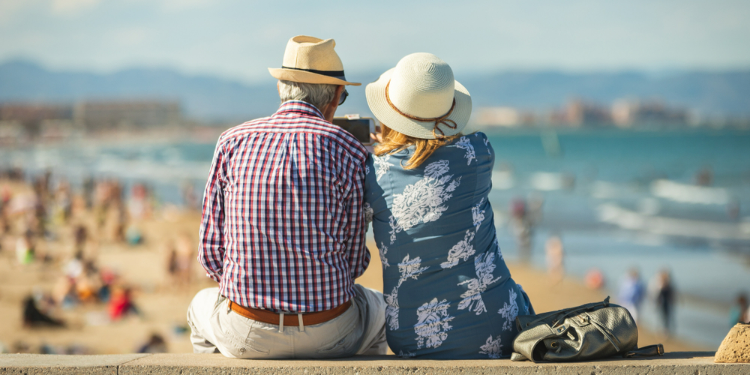
Higher standards of living, a better quality of life, nature, a change of scenery, reuniting with loved ones, etc., are some of the reasons why people choose to retire abroad. While for some, it's a dream come true, for others, it can be challenging. Still, Morocco, Thailand, Portugal and Greece are among the world's best countries for retirement in 2022.
In theory, retiring abroad should not be an issue. You can still receive your retirement pension while residing abroad, depending on the formalities relating to your basic and supplementary pension schemes. But what if the payment is delayed or interrupted? What about other documents, tax conditions, administrative complications, etc.? All of these can seriously compromise your retirement abroad.
The pandemic impact on expat retirement
Cynthia and Edd Staton, a retired expat couple in Ecuador, testified to CNBC in March 2020 as the Covid-19 pandemic paralyzed the whole world. Retiring abroad plans are struck by uncertainty. Many questions, including healthcare, remain unanswered. According to the couple, it would be a mistake to only consider the low cost of healthcare without ensuring the quality, the location of care facilities or any additional expenses that can occur, especially in case of emergency. The Covid pandemic proved him right. Cynthia says, “We know expats who pay out of pocket or contribute to private or local health schemes". The couple has subscribed to complementary health insurance, hoping to deal with any health issues they may encounter more easily. Their choice is seconded by Howard Pressman, financial planner and partner of the American company Egan, Berger & Weiner in Vienna, Virginia. "It's that point in life when healthcare is extremely important. It's highly recommended that you carefully consider the type of healthcare you will be entitled to overseas as a retiree, and not just in terms of cost."
Many expat retirees have faced a lot of difficulties regarding access to healthcare during the pandemic. Their issues included access to vaccines and healthcare in general since medication was not easily available and hospitals were overcrowded. Many retirees were stranded abroad and were faced with unforeseen health expenses, considering additional costs related to lockdowns. Besides, government aid has not always been enough to make up for the loss of income. As a result, the advice given by professionals was to avoid retiring abroad, especially at the peak of the crisis. Therefore, many retirees had to rethink their moving abroad plans. While some have given up, others preferred safer countries, particularly in terms of access to healthcare, such as Portugal.
Administrative delays
“Our problem is that often documents pass through foreign postal systems that are beyond our control and are not always completely reliable. Sometimes, these certificates do not even reach their destination – thus, pension payments are suspended without notice, and this can have a lot of consequences for certain people with low income. In 2016, Bernard Garnavault launched an online petition to encourage the French the government to implement more straightforward procedures. His issue was the life certificate that the Pension and Occupational Health Insurance Fund (Carsat) sent each year to retirees residing abroad. The life certificate (known as the certificat d'existence, or attestation d'existence in French) is a document proving that a person is still alive at a given time and, therefore, still eligible for a retirement pension, regardless of their nationality. So people who choose to retire abroad need to have their life certificate authenticated by competent local services.
Bernard was an expat in Thailand and communicated his provisional address to the services. However, he never received the life certificate of life. As a result, in the absence of proof, the standard procedure was applied. Bernard was considered dead and his pension was suspended. At that time, the procedure was carried out only by post. However, things changed in France on November 1, 2019. Today, people who choose to retire abroad no longer have to provide a life certificate to each of their pension funds – they can use a single certificate for all of their funds. Besides, the whole procedure has been digitalized. But once again, the pandemic questioned the whole system. During lockdowns, many retirees were unable to have their life certificates authenticated with the competent local authorities. Considering the impact of the health crisis, pension organizations did extend the deadlines for submitting life certificates by two months. Still, expat retirees did face financial issues during that period.
Other dysfunctions raised by expat retirees include technical issues when sending/receiving documents on the pensions website, payment delays, etc. It's worth noting that such delays can have significant economic consequences on the daily life of retirees whose main source of income is retirement pension, especially since no compensation is provided. With sometimes a delay of several months, the variations in income can lead to major changes in tax rates. Others were even compelled to borrow money.
Covid has undeniably compromised the experiences of foreign retirees. So if you're looking to retire abroad as borders reopen and the situation improves around the world, there are still many things to consider. If possible, try testing the waters (preferably not in summer) to see whether you are actually ready to spend the rest of your life there. Also, avoid choosing a so-called low-cost country. Admittedly, the cost of living in some countries leaves you under the impression that you have greater purchasing power; however, healthcare might be more expensive, so you may end up spending much more than expected. Keep an eye on tax rates as well, and check whether you are eligible for any benefits, considering the cost of living. It's also good to inquire about any agreements between your home country and your host country (especially regarding taxes).



















